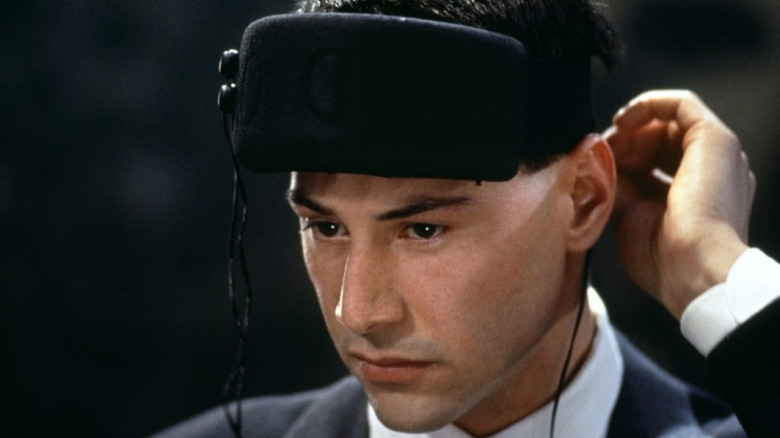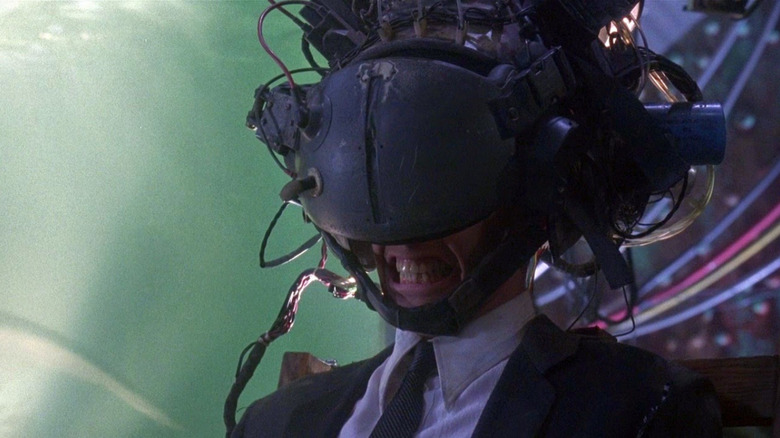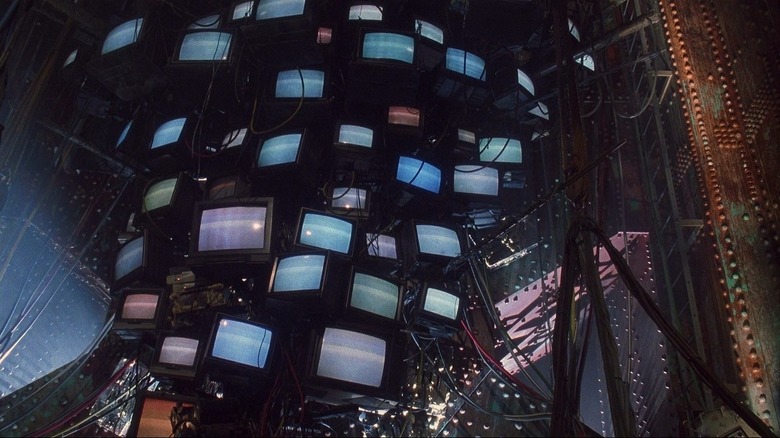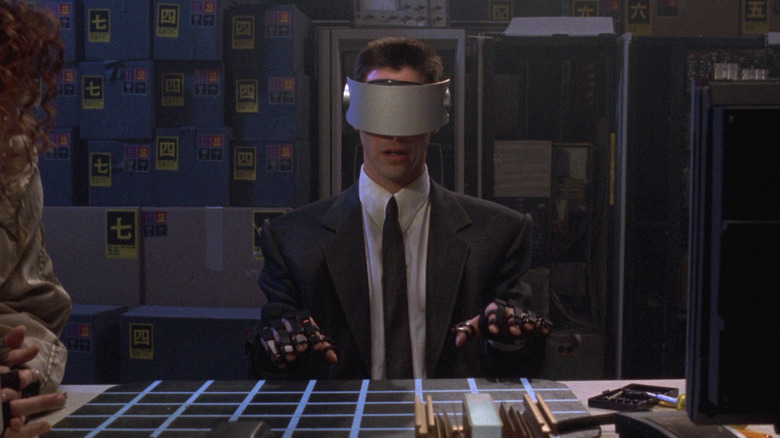Keanu Reeves' Johnny Mnemonic Predicted The Future With A '90s Take On '80s Cyberpunk
The 1990s were a wild time in the world of science fiction cinema, as we all reeled from the technological advances of the 1980s and tried to predict what would come after the year 2000. Then there's the totally gonzo and surprisingly prescient "Johnny Mnemonic," based on the 1981 short story by cyberpunk god William Gibson, predicting the weird and wild future of the year 2021. Unlike its contemporaries like "Judge Dredd" and "Demolition Man," "Johnny Mnemonic" was truly interested in embracing the "science" aspect of science fiction, even if it ended up being a bit too audacious for most audiences. With a screenplay by Gibson himself and starring a freshly-famous Keanu Reeves, hot off of "Speed," "Johnny Mnemonic" had the potential to be a sci-fi classic. Instead, it's a fun and fascinating misfire that takes huge swings. Sometimes it works, sometimes it doesn't, but it's always taking its strange vision of the future 100% seriously.
Reeves would go on to star in the cyberpunk classic "The Matrix" only five years later, but "Johnny Mnemonic" is too interesting to let slip into obscurity in its wake. Not only is it a totally gonzo, bonafide cyberpunk ride with a terrific cast, but it manages to predict some pretty stunning things about living in the information age, despite being an extremely '90s movie based on an '80s short story. Get yourself some room service, because I'm here to explain why "Johnny Mnemonic" is so much better than most people give it credit for.
Data is everything
"Johnny Mnemonic" was the feature directorial debut of music video director and artist Robert Longo, though, unfortunately, it was plagued by production issues, as the studio wanted a summer blockbuster and Gibson and Longo just wanted to adapt the short story as best they could. In the end, the desire for marketability is what sinks the movie, as just enough of Gibson's bite is taken away to render things toothless. It's a crying shame, too, because there's a surprising about that the story gets right.
"Johnny Mnemonic" tells the story of Johnny (Reeves), an information courier who ends up storing a massive program on his brain implant. The exact nature of the data in his mind is a mystery for much of the movie, but everyone wants what's in Johnny's head. Johnny, a smartass internet buff in a nice suit, really just wants the data out of his head, because it's killing him. While we're not exactly at the point of having metal installed in our craniums in order to literally "plug in" to the internet just yet, the story accurately predicted one of the great truths of the 21st century: information is currency.
Plugged in for constant content
Information overload is literally killing Johnny and his companion Jane (Dina Meyer) in different ways. They're victims of the world they live in, where everyone has to be on top of the latest data in order to survive. Watching the way both users and various news outlets have reacted to the slow-burning death of Twitter, we're honestly not that far off.
In the movie, people are basically signing their lives away in order to be connected to information at all times. There are screens everywhere, including one massive cross of televisions that's possibly the least subtle thing in this not-so-subtle flick. People are addicted to their screens even though it's killing them. That's pretty relevant to our own time, where sensitive information is a hot commodity, but everyone's basic information is worth a pretty penny, too. Many free online services turn their users into products by selling their private information to third parties. Everyone's just looking for info, at whatever cost.
There are a couple of other fun predictions too, like a television channel dedicated entirely to nostalgia and virtual reality headsets that actually look a lot like the ones we currently have, but unfortunately the other big prediction "Johnny Mnemonic" nailed was through its villain: the pharmaceutical companies.
A world ruled by corporations
One of the major tenets of cyberpunk is a world where corporations have more power than governments, and "Johnny Mnemonic" definitely fits the bill. Like its contemporary "Judge Dredd," which used its satire of law enforcement to highlight class inequality, "Johnny Mnemonic" uses its tale of techno-thievery to criticize the pharmaceutical companies of our own world. The pharma corps are willing to keep proven cures for deadly diseases away from the public because they know they'll take a profit loss on treatments, which isn't all that hard to imagine. The pharmaceutical giants are the villains in a number of recent shows and films, including numerous dramatized and documentary-style takes on the opioid crisis. Just like with the companies selling your information, it all comes down to profit. People are either potential buyers for a product or they are the product, but corporations will never see them as anything more.
We may not have cybernetic implants or junkie techno-dolphins named Jones to help us surf the web just yet, but "Johnny Mnemonic" was spot-on when it came to predicting the capitalist terror of our semi-cyberpunk present.



